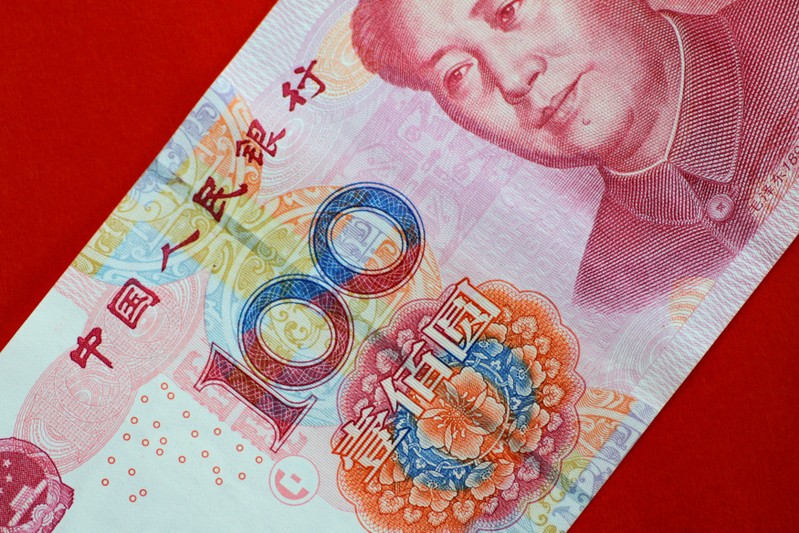
FILE PHOTO: A China yuan note is seen in this illustration photo May 31, 2017. REUTERS/Thomas White/Illustration/File Photo
October 10, 2018
By Vivek Mishra
BENGALURU (Reuters) – China’s yuan is forecast to pare some of its recent losses against the dollar over the coming year on hopes that risks from an escalating U.S.-China trade war and a deep sell-off in emerging markets will subside, a Reuters poll found.
Having weakened over 6 percent so far this year, the yuan hit a 7-week low on Monday after the People’s Bank of China (PBOC) loosened policy by cutting the ratio of cash that banks must hold as reserves.
The PBOC’s decision was its latest move to try and bolster an economy that is feeling the heat of a tit-for-tat tariff dispute with the United States.
While most strategists left their currency predictions unchanged after the PBOC cut reserve requirements, the latest 12-month yuan view was the most pessimistic forecast in Reuters polls since October last year.
The yuan <CNY=CFXS> was expected to gain around 1.7 percent to 6.80 per dollar in a year’s time from around 6.92 currently, according to the poll of over 50 foreign exchange strategists.
Sixteen strategists see the yuan weakening to 7 to the dollar or higher at some point over the 12-month period, the highest number of respondents in the Reuters poll predicting that since August 2017.
“The most likely scenario for a strong CNY rebound against USD is for risk-on sentiment to resume again. This will likely only come when the negativity from U.S.-China tensions and EM risks fades,” said Jeff Ng, Asia chief economist at Continuum Economics.
“We believe that the most likely trigger would be a resolution of U.S.-China trade talks, given the unpredictable nature of U.S. President Donald Trump. Other possible triggers could also stem from a stronger trade relationship between China and Europe or investors finally finding another positive reason to put risk on the table again.”
Trump imposed tariffs on $200 billion worth of Chinese imports last month, in addition to duties on $50 billion of goods previously announced. China has retaliated and plans for new trade talks between Beijing and Washington recently collapsed.
That bitter trade dispute between the two world’s biggest economies pushed the International Monetary Fund (IMF) to lower its China’s 2019 economic growth forecast to 6.2 percent from 6.4 percent.
But most currency strategists remained optimistic on the yuan’s outlook for the coming year on hopes some trade negotiations will be initiated between Washington and Beijing. Those expectations are also dependent on a fading in the dollar’s safe-haven appeal. [EUR/POLL]
According to a wider Reuters foreign exchange poll, the U.S. dollar rally, which has had its best run so far this year since 2015, will last only another three to six months.
“We expect the dollar rally to lose steam. We believe that the yuan is significantly oversold as indicated by all technical indicators,” said Amy Yuan Zhuang, chief Asia analyst at Nordea.
“In a year’s time, the market will likely realize that the trade war has hurt the Chinese economy less than expected and the sentiment on China will improve from the current level.”
But not all currency strategists expect the yuan to appreciate over the coming 12-months.
Nearly half – 18 of 37 common contributors in the latest survey and a September poll – revised forecasts to a weaker yuan, citing expectations for more policy easing from China’s central bank in coming months.
Eight respondents revised their forecast to reflect a stronger currency, while the remaining 11 left projections unchanged.
“The risk of further Chinese yuan depreciation comes not so much from the tariff war turning into a currency war, but more from Beijing’s policy responses to cushion the economy,” Philip Wee, an FX strategist at DBS Bank, wrote in a note.
(Polling by Khushboo Mittal and Vivek Mishra; Editing by Ross Finley and Shri Navaratnam)

